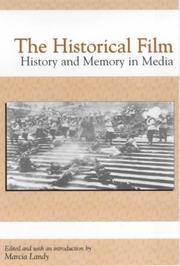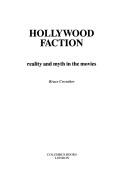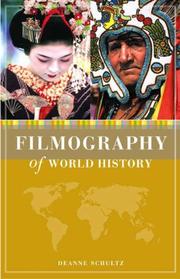| Listing 1 - 10 of 172 | << page >> |
Sort by
|

ISBN: 9780485300963 0485300966 Year: 2001 Publisher: London: Athlone,
Abstract | Keywords | Export | Availability | Bookmark
 Loading...
Loading...Choose an application
- Reference Manager
- EndNote
- RefWorks (Direct export to RefWorks)
Book
ISBN: 9783837649352 3837649350 Year: 2019 Publisher: Bielefeld: Transcript,
Abstract | Keywords | Export | Availability | Bookmark
 Loading...
Loading...Choose an application
- Reference Manager
- EndNote
- RefWorks (Direct export to RefWorks)
Book
ISBN: 989260993X 9892609921 Year: 2015 Publisher: [Place of publication not identified] : Coimbra University Press,
Abstract | Keywords | Export | Availability | Bookmark
 Loading...
Loading...Choose an application
- Reference Manager
- EndNote
- RefWorks (Direct export to RefWorks)
Cecil B. DeMille (1881-1959) foi longamente estigmatizadona cultura contemporânea e o estereótipo do «estilo DeMille» ficou de tal formaenraizado no imaginário da cultura que foi preciso esperar pelos anos 90 doséculo XX para se assistir ao reconhecimento pleno da sua obra, tanto no âmbitoda crítica especializada como nos meios académicos.
Constituindo-se como umaviagem nos denominados filmes históricos do realizador norte-americano, opresente trabalho assume-se como uma reflexão sobre Cinema e História, a partirda análise das formas propostas por DeMille para representar as denominadas AntiguidadeClássica e Idade Média. Demonstra ainda o gosto evidente do realizador de Os Dez Mandamentos pela manipulação demúltiplas tradições culturais (literárias, pictóricas, teatrais, operáticas) einterpreta a sua construção de uma teia complexa de fontes que, na perspectivada autora, se constituem como elementos de afirmação e deidentidade da própria cultura contemporânea ocidental.Book
ISBN: 3412151750 Year: 2019 Publisher: Wien ; Köln ; Weimar : Böhlau Verlag,
Abstract | Keywords | Export | Availability | Bookmark
 Loading...
Loading...Choose an application
- Reference Manager
- EndNote
- RefWorks (Direct export to RefWorks)
In Osteuropa beschaftigen sich immer mehr Kinofilme und Fernsehserien mit historischen Themen. Dabei wird oft ein patriotisches Grundstimmung erzeugt, die emotional aufgeladen wird. Kinofilme und Fernsehserien werden in Russland, Polen und der Ukraine heute immer ofter im Dienst der Geschichtspolitik eingesetzt. Staatliche und private Akteure greifen kontroverse historische Themen auf und binden sie in melodramatische Szenarios ein. Dabei werden auch umstrittene historische Figuren neu gedeutet und als nationale Vorbilder prasentiert. Geschichte wird so in ein anschauliches und attraktives Spektakel eingebunden. Die historischen Filmhelden durchlaufen schwierige Biographien, die in ihrer emotionalen Aufladung an mediale Konsumgewohnheiten heutiger Zuschauer angeglichen werden.
Book
ISBN: 365777677X Year: 2013 Publisher: Paderborn : Verlag Ferdinand Schöningh,
Abstract | Keywords | Export | Availability | Bookmark
 Loading...
Loading...Choose an application
- Reference Manager
- EndNote
- RefWorks (Direct export to RefWorks)

ISBN: 0862870976 Year: 1984 Publisher: London Columbus books
Abstract | Keywords | Export | Availability | Bookmark
 Loading...
Loading...Choose an application
- Reference Manager
- EndNote
- RefWorks (Direct export to RefWorks)
Book
ISBN: 389398111X Year: 1992 Publisher: Marburg an der Lahn Hitzeroth
Abstract | Keywords | Export | Availability | Bookmark
 Loading...
Loading...Choose an application
- Reference Manager
- EndNote
- RefWorks (Direct export to RefWorks)

ISBN: 0313326819 Year: 2007 Publisher: Westport Greenwood
Abstract | Keywords | Export | Availability | Bookmark
 Loading...
Loading...Choose an application
- Reference Manager
- EndNote
- RefWorks (Direct export to RefWorks)
Book
ISBN: 9783319894072 Year: 2019 Publisher: Cham : Palgrave Macmillan,
Abstract | Keywords | Export | Availability | Bookmark
 Loading...
Loading...Choose an application
- Reference Manager
- EndNote
- RefWorks (Direct export to RefWorks)
The essays in this volume seek to analyze biographical films as representations of historical individuals and the times in which they lived. To do this, contributors examine the context in which certain biographical films were made, including the state of knowledge about their subjects at that moment, and what these films reveal about the values and purposes of those who created them. This is an original approach to biographical (as opposed to historical) films and one that has so far played little part in the growing literature on historical films. The films discussed here date from the 1920s to the 2010s, and deal with males and females in periods ranging from the Middle Ages to the end of the twentieth century. In the process, the book discusses how biographical films reflect changing attitudes towards issues such as race, gender and sexuality, and examines the influence of these films on popular perceptions of the past. The introduction analyses the nature of biographical films as a genre: it compares and contrasts the nature of biography on film with written biographies, and considers their relationship with the discipline of history. As the first collection of essays on this popular but understudied genre, this book will be of interest to historians as well as those in film and cultural studies.
Book
ISBN: 2916097201 9782916097206 Year: 2009 Publisher: Montreuil: Omniscience,
Abstract | Keywords | Export | Availability | Bookmark
 Loading...
Loading...Choose an application
- Reference Manager
- EndNote
- RefWorks (Direct export to RefWorks)
Actualities (Motion pictures) --- Historical films --- France
| Listing 1 - 10 of 172 | << page >> |
Sort by
|

 Search
Search Feedback
Feedback About UniCat
About UniCat  Help
Help News
News